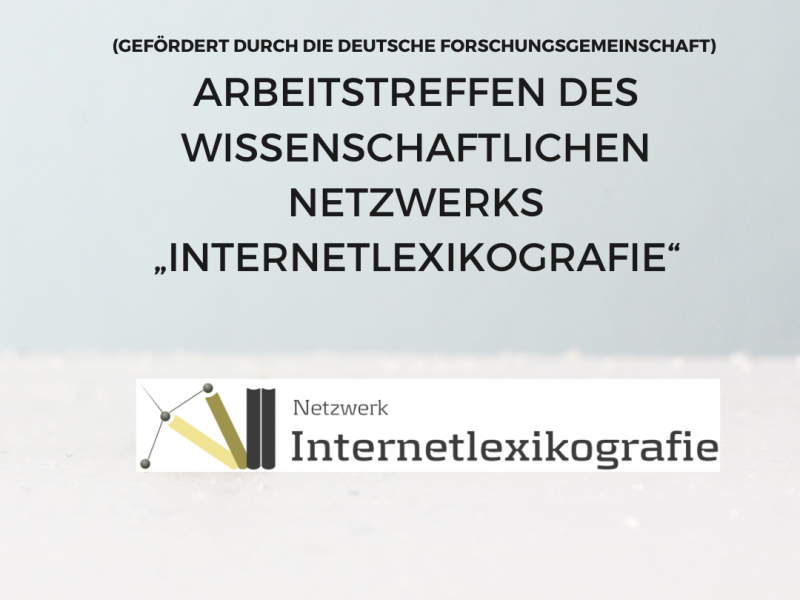3. Working meeting on Internet lexicography
"Automatic extraction of lexicographical information"

Date:
03.05.2012 bis 04.05.2012Place:
European Academy Bozen (EURAC) (Drususallee 1, 39100 Bozen)
Categories:
Conference3rd workshop of the academic network on “Internet Lexicography” (supported by the Deutsche Forschungsgemeinschaft)
Topic "Automatic extraction of lexicographic information"
The availability of large electronic corpora has changed lexicography dramatically (Teubert 1999). Monolingual and multilingual dictionaries are increasingly corpus-based, and this is happening irrespective of publication medium. At the same time, corpus linguists have developed effective tools for searching and analysing corpora, while computational lexicographers and linguists have
contributed to, for example, automatic disambiguation and the development of lexical semantic resources (e.g. ontologies). By using such tools, lexicographers have improved the quality of the content of dictionaries, but the inventory of information in printed dictionaries is little changed.
Since online dictionaries are not subject to space restrictions, they can contain very detailed and completely new kinds of lexicographical information (Haß 2005, Klosa 2010). What information this could be (e.g. frequency, collocations, set phrases) and how lexicographically acquired and automatically compiled information in online dictionaries can be combined, will become clear at the workshop through the introduction of appropriate tools and dictionaries. Thereby, the aim will also be to answer the question of direct connection to the underlying online corpus, as well as the utilisation of word-nets in online dictionaries.
Mittwoch, 2. Mai 2012
19:00 Warm-up
Restaurant „Walthers‘“, Waltherplatz 6, Bozen
Donnerstag, 3. Mai 2012 (Seminar 2-3) (öffentlich)
08:45-09:00 Arrival
09:00-09:45 Welcome and presentation of EURAC & the Institute for Specialised Communication and Multilingualism
Andrea Abel (Europäische Akademie Bozen)
09:45-10:30 You can tell a word by the (visual) company it keeps: extracting lexico-semantic information from text and images
Marco Baroni (Università degli Studi di Trento - Center for Mind/Brain Sciences (CIMeC)
10:30-11:00 Coffee break
11:00-11:45 Do we need lexicographers? Prospects for automatic lexicography
Adam Kilgarriff (Lexical Computing Ltd Brighton)
11:45-12:30 From DWDS-corpora to a German Word Profile - methodological problems and solutions
Jörg Didakowski, Alexander Geyken (Berlin-Brandenburgische Akademie der Wissenschaften)
12:30-14:00 Mittagspause / Lunch break
14:00-14:30 Guided tour through EURAC
14:30-15:15 Towards a Firthian notion of collocation
Stefan Evert, Sabine Bartsch (Technische Universität Darmstadt)
15:15-16:00 Exploration of quantitative phenomena for internet dictionaries, using the example of E-VALBU and KoGra-DB
Roman Schneider (Institut für Deutsche Sprache, Mannheim)
16:00-16:30 Coffee break
16:30-17:15 Dictionary-cum-corpus-query-tools: A step towards more customisation in pedagogical lexicography?
Magali Paquot (Université Catholique de Louvain)
17:15-18:00 Final discussion
(Chair: Andrea Rapp, Technische Universität Darmstadt)
19:00 Social dinner
Restaurant „Vögele“, Goethestr. 3, Bozen
Freitag, 4. Mai 2012 (Seminar 2-3) (intern)
08:45-09:00 Arrival
09:00-09:45 Short presentations
1) On visual approaches towards corpus exploration
Egon Stemle/Verena Lyding/Lionel Nicholas (EURAC Bozen)
2) Usage studies on automatically generated lexicographic information
Carolin Müller-Spitzer (IDS Mannheim)
3) Automatically generated information for lexicographers
Annette Klosa (IDS Mannheim)
09:45-11:00 Working group I – Automatically generated information for lexicographers
(Chair: Andrea Abel, EURAC Bozen)
Working group II – Automatically generated information for users
(Chair: Stefan Engelberg, IDS Mannheim)
11:00-11:30 Coffee break
11:30-13:00 Präsentation der Ergebnisse aus den Arbeitsgruppen und Diskussion
(Moderator: Angelika Storrer, Technische Universität Dortmund)
13:00-14:00 Lunch break
14:00-15:30 Internal discussion and conclusion
(Chair: Annette Klosa, IDS Mannheim)

